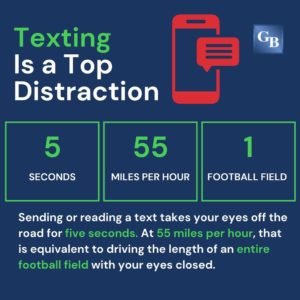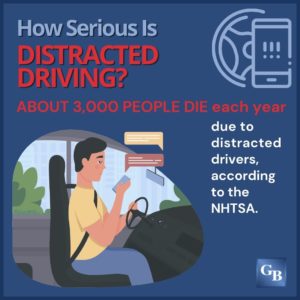On average, more than 3,000 people die and 1,000 are injured each year in distracted driving car accidents in the United States, according to the National Highway Traffic Safety Administration (NHTSA). Anything that takes a driver’s focus off the road is a distraction.
Distracted driving behaviors are broken down into three main categories:
- Visual: Eyes are off the road.
- Manual: Hands are off the steering wheel.
- Cognitive: The mind is not focused on driving.
It is important to note that a distraction can be in more than one category, however, all distractions are dangerous.
To prevent a distracted driving accident, you should be aware of common distractions. The following are primary causes of distracted driving accidents.
Cellphones
Drivers have been caught doing the following with their cellphones:
- Answering calls.
- Dialing numbers.
- Talking.
- Sending and receiving texts or emails.
- Using social media.
- Watching videos.
- Taking pictures.
Doing any one of these activities is enough to cause a serious accident. Taking your eyes away from the road for even a few seconds can cause a car accident.
Rowdy Passengers
Noise and horseplay can distract a driver from focusing on the road. Many times, teenage drivers will load their cars with friends who may listen to loud music, yell, and laugh loudly, or engage in horseplay.
An inexperienced teenage driver coupled with rowdy passengers is a dangerous combination. Sometimes, children and siblings in the car will fight or become unruly. They can be extremely distracting as well.

Loud Radio, Video, or Games
Drivers will sometimes turn up the volume on a favorite song, or children in the car playing with games or watching videos can cause excessive volume. Loud distractions inside the vehicle will affect the driver’s ability to remain focused on the road. In addition, emergency vehicle sirens are challenging to hear when there is noise inside the car.
Programming the GPS System
A GPS device is a great, helpful system and a boon to travelers. Unfortunately, they can also be distracting if not used correctly. Looking down frequently at directions or programming the system while driving are major distractions.
Program the device before you leave or pull over to a spot to do so safely. Also, position the GPS where it is easy to see in front of you and use the voice settings.
Adjusting Controls
Today’s cars have many buttons, toggles, switches, and programmable settings. Adjusting controls while driving is a definite distraction. It only takes a second for a driver to lose control of the vehicle while adjusting the air conditioning, heat, seat warmer, or infotainment systems. It is best to wait until you are safely parked to make your adjustments, or have a passenger help you adjust controls.
Using Infotainment Systems
Many new cars have a screen that provides necessary vehicle information, a rearview camera, and entertainment. While these technological advances can be great, they can also be distracting. Interacting with the screens while driving is dangerous. Wait until you are stopped to adjust.
Reaching for Items
Nearly every driver has dropped something in their vehicle. Many motorists have tried to get objects while also trying to drive. Reaching down, moving across the passenger seat or into the glove compartment, or reaching to the back seat simply cannot be done safely while driving. Pull over safely if you need the object immediately.
Eating and Drinking
Pulling food from a bag or grabbing a drink cannot be done safely while driving. Also, think about the spills, drips, and other mishaps with fast food. It is best to pull into a parking spot once you leave the drive-thru lane or wait until you are home to eat.
Daydreaming
It is easy, especially on long trips, to become lost in thought. Even a short drive home from work can distract you. Most people are unaware that they are daydreaming until they need to stop or react quickly to an emergency.
Grooming
Some drivers think it is okay to apply makeup, clip their nails, put in contact lenses, brush their hair, or even shave while driving. All these actions should not be done in the car.
Transporting Pets
Most dogs love a car ride, and sometimes pets need to travel too. However, loose pets are huge distractions. A loose pet can get caught in the driver’s legs or feet or try to sit behind the wheel. They may beg for pets or bark at everything in sight. The best way to transport your pet is in a travel carrier or with safeguards that keep the pet secure in one place.
Getting Revenge
Unfortunately, road rage still exists. A driver may be angry about another motorist’s perceived slight or mistake. They become distracted by their anger and begin to drive recklessly and aggressively to seek revenge.
Gawking
It may be tempting to gawk at a car accident or something else on the road. The problem is that your eyes are off the road when this happens, and an accident can happen. Accidents can occur when drivers gawk at roadside emergencies or collisions.
What Are Pennsylvania Distracted Driving Laws?
Every state has laws against using cellphones while driving, some stricter than others. In Pennsylvania, Title 75 of the vehicle code prohibits anyone in the state from using an interactive wireless communication device to send, read, or text while driving. An interactive wireless communication device includes a wireless phone, personal digital assistant, smartphone, portable or mobile computer, and other similar devices. Drivers in Pennsylvania are also prohibited from wearing headphones and earphones.
The penalty for using an interactive wireless communication device while driving is a fine plus court costs and other applicable fees. offense will be noted on a commercial driver’s record.
Pennsylvania also has Daniel’s Law, which increases the penalties if a driver causes injuries or death to another person while texting behind the wheel. The law was named for Daniel Gallatin, a volunteer firefighter and military veteran killed in a fatal motorcycle accident caused by a distracted driver. Under Daniel’s Law, a driver can face a two-year jail sentence for causing serious bodily injury while texting, or a five-year jail sentence for causing a fatality while texting.
Because distracted driving laws vary by state, your safest option is to refrain from using cellphones and other devices in every state you drive. Claiming ignorance of the law will not get you out of a citation.

How Can I Prove Negligence?
In most states, a driver who sues another driver (plaintiff) for causing an accident must prove that the driver being sued (defendant) was negligent. In Pennsylvania, negligence is defined as the failure to use reasonable care to prevent harm to yourself or others. If the plaintiff can prove that the defendant was using an electronic communication device or was otherwise distracted when the accident occurred, they can typically establish negligence.
Also, in Pennsylvania and many other states, if a defendant was cited for violating a distracted driving statute, they will be presumed negligent. They will then have the burden of proving they did not cause the accident. In legal terms, this is referred to as “negligence per se.”
Essential Steps to Take if Hit by a Distracted Driver
No matter how minor or severe the accident, there are steps you should take after a distracted driving collision:
- Call 911. This will summon medical help and ensure police response and an official police report.
- Always accept medical help on the scene, even if you do not feel your injuries are severe. If you do not accept or seek medical attention, an insurer can claim that you were not hurt and refuse to pay any medical bills. Get medical attention afterward as well.
- Take pictures and videos of the scene. Capture the accident scene in its entirety: vehicle damage, strewn parts, the position of the vehicles, location of the accident, weather conditions, road conditions, and injuries.
- Talk to witnesses. Get witness statements, names, and contact information as quickly as possible. Witnesses may not wait at the scene until law enforcement arrives, so urgency is required. Witness statements help law enforcement and lawyers determine who is at fault.
- Keep careful records of injuries and medical bills. Explain thoroughly and in detail what hurts and what happened to your doctor. Your words will be noted in medical reports and records, which an insurance company will use later when evaluating your claim. A file of medical bills, insurance payments, out-of-pocket payments, and other costs related to your injuries will prove invaluable later.
- Start a journal. Memories fade, so note everything you can about what occurred during and after the accident, including any discussions with your employer, insurance companies, or others.
- Follow the doctor’s orders. Not following through on recommended therapies, medications, and other treatments can make it seem as if you are not injured. Do not give insurers the chance to devalue your accident.
- Do not talk to, agree, or sign anything with an insurance company. Insurers are in the business of minimizing their losses, not fully covering yours, even your insurer. They may prey upon your fears of medical bills and lost income and offer a low-ball amount to settle. Do not take it without consulting with a lawyer first.
- Speak with a Philadelphia car accident lawyer. If you were injured in a car accident, you will need an experienced lawyer on your side. They know how to negotiate with insurers and how to present the most substantial evidence possible on your behalf. If needed, they will build your case and take it to court.
How Can Galfand Berger LLP Help Me After a Distracted Driving Accident?
No one’s life should be turned upside down by a distracted driver. Our legal team takes distracted driving accidents seriously. We will work to prove the other driver was negligent. Our clients can expect:
- Compassionate people: Our legal team will listen closely and care deeply. We will begin your case by understanding your losses and what you hope to achieve from the legal process. Then, we will get to work right away.
- Skillful investigators: Car accidents can be highly complex, and every collision case needs a thorough investigation to find the actual negligent party.
- Vast network of resources: Sometimes, a car accident investigation requires the knowledge and analysis of experts. We have a network of professionals to call on who are essential, credible authorities who can help.
- Professional negotiators: Recovering fair compensation usually involves negotiations with insurers to avoid going to court. Insurance adjusters are trained to minimize their company’s losses, not yours. We know how to defend against their practices.
- Experienced litigators: When an insurer refuses to offer a fair settlement, we will confidently take your case to court. We have the experience needed to build and argue a strong case. We will pursue justice for you.
Philadelphia Car Accident Lawyers at Galfand Berger LLP Will Help You Prove a Distracted Driver Caused Your Accident
If you have been injured in a distracted driving car accident, you deserve justice. One of our Philadelphia car accident lawyers at Galfand Berger LLP can review your case and present your legal options. Call us at 800-222-USWA (8792) or complete our online form to schedule a free consultation. We serve clients throughout New Jersey and Pennsylvania, including Allentown and Harrisburg, from our offices in Philadelphia, Bethlehem, Lancaster, and Reading, Pennsylvania.
 Google Screened
Google Screened
